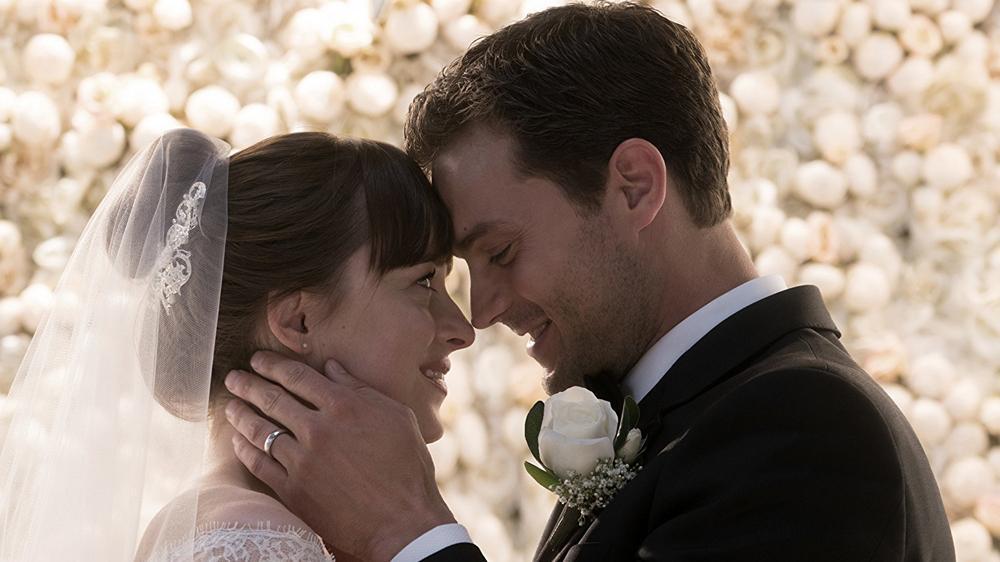Fifty Shades Freed review: A very trite and silly third film
(18) Dir James Foley, 105 mins, starring: Dakota Johnson, Jamie Dornan, Luke Grimes, Tyler Hoechlin, Eric Johnson, Eloise Mumford, Rita Ora

Fifty Shades of Grey grossed $571m (£414m) worldwide. Its successor, Fifty Shades Darker, made $381m. The downward trend is bound to continue with Fifty Shades Freed, the very trite and silly third film in the trilogy. This may be the end of the cycle but, as long as there is still any money to be made, Universal will probably try to keep the EL James franchise alive somehow (whatever brickbats the critics throw at them).
“Don’t miss the climax” the poster tells the audience. The problem here is that there isn’t really one. Fifty Shades Freed may just about have earned its 18 certificate but it’s the blandest, soppiest, least dramatic film of the three. Its plot would barely pass muster in the most far-fetched telenovela. Christian (Jamie Dornan) takes Anastasia (Dakota Johnson) to the “red room” once or twice but his heart isn’t really in it. Nor is hers. They’re a married couple now and they have more to think about than recreational S&M. “Babies happen when you have sex and you and I tend to do a lot of that,” Ana tells Christian at one stage, as if she has only just discovered the facts of life.
The new film is as much concerned with conspicuous consumption as it is with sex anyway. Luxury abounds. Whether it’s the jewellery, the sports cars, the modernist paintings on the walls, the palatial chalet in Aspen or the enormous apartment in Seattle, everything in Christian Grey’s world reminds us of the extent of his wealth.
All Christian’s money can’t help him turning into just another hen-pecked husband. “You need a shave,” Ana barks out at him early on. “You need a haircut,” she tells him a little later. She is the assertive one and he is becoming very uxorious.
27 films to look out for in the first half of 2018
Show all 27The sex scenes are still filmed like glossy commercials for chocolate or aftershave. There will always be some soft rock pumping loudly on the soundtrack. “All good boys go to heaven but bad boys bring heaven to you,” is the chorus to one of the songs playing in the background as Ana and Christian make out. The lyric hints at what has now become the film’s biggest problem. Christian isn’t the bad boy any more – and that defeats the entire purpose of the story. He has even started cooking for Ana and singing soppy ballads at the piano. In keeping with the gooey mood, there is an excruciating scene in which the lovers lick ice cream off one another’s skins.
Ana’s career is blossoming. She is the new fiction editor at her company SIP and is overseeing the publication of a book called Purgatory by the buff Boyce Fox (Tyler Hoechlin), who looks more like a surfer or bodybuilder than an author of highbrow literary novels. Christian is suspicious about how much time she is spending with Boyce – but even his jealousy is half hearted.
The psychopathic Jack Hyde (Eric Johnson, looking even more manic than in the last film) is still on the loose and is stalking Ana. Christian has spent a fortune on bodyguards and has the Seattle police on speed dial but that doesn’t stop Jack. Somehow (it is never explained how) he can always get past security. He has a grudge against Ana because she has “stolen” his job and an even bigger one against Christian because he has “stolen” his life. (It turns out that Christian and Jack were in foster care together.)
Niall Leonard’s screenplay is full of red herrings and non-sequiturs. At one stage, Ana has an erotic dream about Eliot (Luke Grimes), Christian’s younger brother. Once she wakes up, she forgets all about it and we are left wondering why the scene was included. She is behind the wheel in surely the least gripping car chase sequence in recent movie history. It doesn’t help that we don’t who is chasing her or why. We’re given hints about tensions in the lives of the supporting characters. Christian’s younger sister, Mia (Rita Ora) has some mysterious connection to Jack Hyde. Eliot may be cheating on his partner Katherine (Eloise Mumford), but, if he is, the filmmakers very quickly lose interest in that particular sub-plot as in so many others.
Some of the puns and sexist innuendo here would make even Benny Hill groan. “I might find an opening” a woman at the publishing company says when she talks about hiring a man she has taken a fancy to. There is much talk about the glamorous architect Gia’s very big “plans” – which is code for her breasts.
Fifty Shades Freed is a glossy affair with high production values. It might provide escapism for undemanding couples looking for Valentine’s Day entertainment or members of hen parties who’ve drunk so much chardonnay that their critical faculties have been dulled. As storytelling, though, it is flaccid and inert. Director James Foley has made some decent thrillers in his time but simply can’t find a way to whip up any dramatic interest here whatsoever.
Subscribe to Independent Premium to bookmark this article
Want to bookmark your favourite articles and stories to read or reference later? Start your Independent Premium subscription today.

Join our commenting forum
Join thought-provoking conversations, follow other Independent readers and see their replies